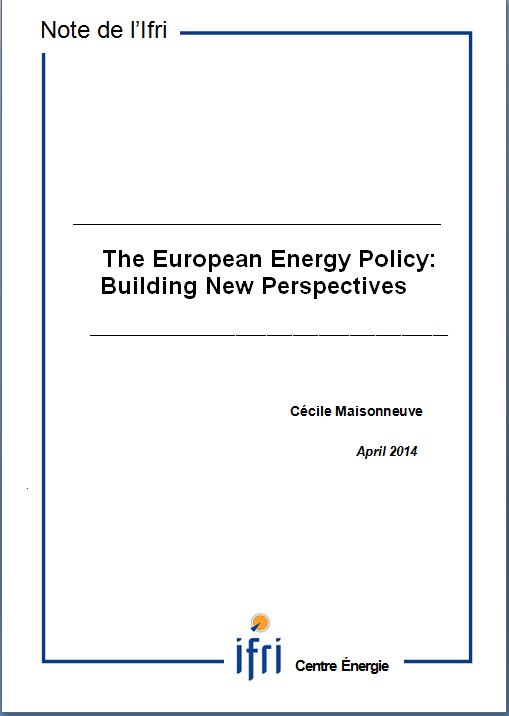The European Energy Policy: Building New Perspectives

“After 17 years of supranationality, we are still seeking how to define a common energy policy and what it might be. [...] Could we have done more in one generation? Or were goals only established to achieve a political balance which it was explicitly agreed to ignore, once the machinery began to operate? Historians will have a hard task to distinguish between excessive ambitions and national hypocrisies”.
While the completion of the internal market in gas and electricity has been announced for 2014, the above observation could indeed be an assessment of the 17 years which have lapsed since the first liberalisation package was adopted in 1996-1998. In fact, this scarcely optimistic judgment was made of the ... European Coal and Steel Community in 1970.[1]
Today a similar assessment could be made: Europe’s policy is surely progressing, and common measures, instruments and rules have been adopted. But at the same time it is possible to observe, paradoxically, a multitude of symptoms reflecting the profound malfunctioning of the system. A European gas market is indeed being constructed, but it remains highly exposed to geopolitical risks, as borne out by the 2014 Ukrainian crisis. Similar problems exist in electricity. There are more and more interconnections between countries. But the backdrop is of dysfunctional price signals and physical deterioration of the networks. Meanwhile the market for CO2 emissions is not fulfilling its role. Another paradox concerns investments, which need to be substantial for networks and for the management of demand. But, it is precisely at this moment that some major power companies and investors have adopted strategies to avoid Europe, stung by policies which no longer provide any mid- or long-term price signals. More profoundly still, an autarkic model is emerging with a return, if not an apology, of individual production by individual consumers and industries that are completely ignoring solidarity.
Does it mean that the construction of a European common energy policy is stuttering? Should our collective and chronic incapacity to build a common European policy be accepted fatalistically?
Renunciation would be more than an error: it would be a serious mistake. The construction of a common energy policy is not an option, but rather a duty. At stake is nothing less than the European Union taking control of its own energy future and ultimately its economic and strategic destiny: the issues involved are geopolitical and geo-economic.
Geopolitical because Europe is and will remain dependent on external supplies of hydrocarbons, even if the EU develops a pro-active and sustained policy for domestic production, whether it is based on coal, hydroelectricity, wind power, solar power, nuclear and geothermal power, shale gas – or energy efficiency. If the aim of reducing dependency and the ensuing energy bill need to be pursued, care must be taken in choosing the path and manner of reducing such dependency. Along with all the other major regions of the world, the European Union cannot take the risk of considering that the era of hydrocarbons is over, for physical, geographical, geological, economic and industrial reasons. And the EU must not under-estimate the problems relating to accessing resources. In fact, countries claiming that they are building a new energy paradigm are also the ones pursuing policies of energy security and establishing for themselves a direct access to producing nations bordering the EU. Is it for the President of the United States to remind Europeans that before accepting energy dependency fatalistically they should also be exploiting their own resources better? This is indeed what Barak Obama asked at the European Union-United States summit in Brussels, on 26 March 2014.
Geo-economic too. According to the latest World Energy Outlook by the International Energy Agency (IEA), Europe (along with Japan) is likely to be among the losers in the global economic competition for exporting energy-intensive manufactured products.[2] In contrast, emerging countries and the United States as well will gain market shares. Of course, thanks to innovation as well as technology and marketing policies, we can develop other export activities. But here too, it is difficult to find the right balance between a policy geared to new industries based on post-fossil fuel energy systems and traditional industries inherited from the coal and oil revolutions. Indeed, we may have too quickly proclaimed our entering the post-industrial era, while not enough work has gone into the continuities between “old” and “new” industries.
The origins of Europe’s severe energy policy problems lie in a failed economic approach, which itself can be partly explained by political and ideological causes. This study seeks to address these political issues. Energy is not an exclusively economic issue, far from it. Since taxation and diplomacy are key aspects, energy is necessarily a political issue that policy-makers must handle. From this point of view, 2014 has to be seen as a political opportunity: it needs to be a year for re-founding a common policy fundamentally, based on two principles. First is the principle of realism, which implies re-situating energy policy in its international environment and putting the issue of costs back into the heart of political decision-making. The second principle is solidarity, in other words the clear restatement that there is a European general interest... which is not the sum of 28 national interests, but also that energy should be viewed as a system, and not as a collection of local policies and interests. Europe’s common energy policy must retain its long term goal of ensuring the energy transition, but it must review the path to achieving this. This transition cannot be a technical, economic and geopolitical bet, which is presently the case. It has to be a controlled undertaking, implying governance and instruments. More generally, the transition requires a very different state of mind (see Section III below), compared to today’s technocratic and non-cooperative approach (Section II), which has led to the prevailing state of energy chaos in Europe (Section I).
[1] “Dans l’histoire de la CECA du rose et du gris ”, Le Monde, 9 mai 1970.
[2] IEA, World Energy Outlook 2013, November 2013.

Available in:
Regions and themes
ISBN / ISSN
Share
Download the full analysis
This page contains only a summary of our work. If you would like to have access to all the information from our research on the subject, you can download the full version in PDF format.
The European Energy Policy: Building New Perspectives
Related centers and programs
Discover our other research centers and programsFind out more
Discover all our analysesAI, Data Centers and Energy Demand: Reassessing and Exploring the Trends
The information and communication technologies sector today accounts for 9% of global electricity consumption, data centers for 1-1.3%, and artificial intelligence (AI) for less than 0.2%. The growing energy demands of cloud services first, and now AI workloads (10% of today’s data centers electricity demand), have exacerbated this trend. In the future, hyperscale data centers will gain shares amongst all kinds of data centers and AI will probably account for around 20% of data centers electricity demand by 2030.
Unlocking India’s Energy Transition: Addressing Grid Flexibility Challenges and Solutions
India is rapidly scaling up its renewable energy (RE) capacity, adding 15–20 GW annually, but the ambitious goal of 500 GW of non-fossil capacity by 2030 is at risk unless the pace accelerates.
Europe’s Black Mass Evasion: From Black Box to Strategic Recycling
EV batteries recycling is a building block for boosting the European Union (EU)’s strategic autonomy in the field of critical raw minerals (CRM) value chains. Yet, recent evolutions in the European EV value chain, marked by cancellations or postponements of projects, are raising the alarm on the prospects of the battery recycling industry in Europe.

The New Geopolitics of Energy
Following the dramatic floods in Valencia, and as COP29 opens in Baku, climate change is forcing us to closely reexamine the pace—and the stumbling blocks—of the energy transition.









